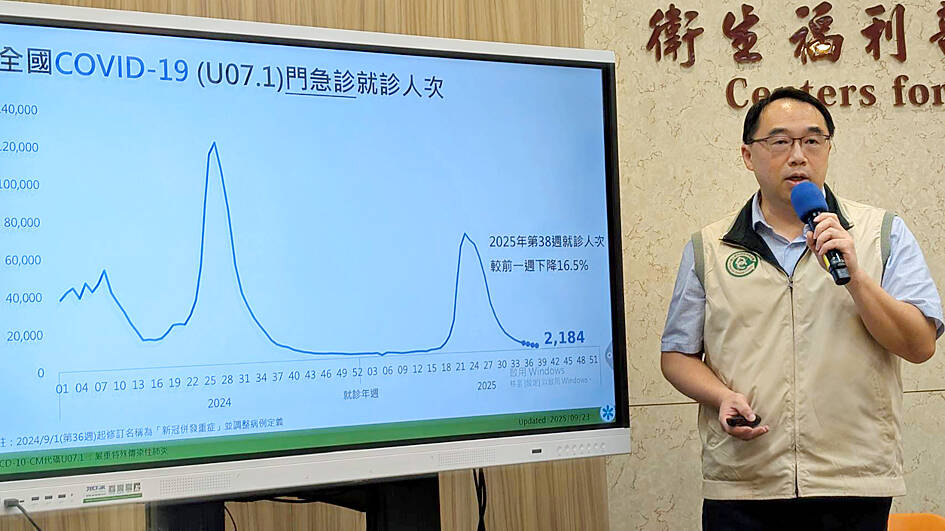The flu season has entered an epidemic phase, the Centers for Disease Control (CDC) said yesterday, adding that COVID-19 cases are also likely to begin climbing next month.
CDC Deputy Director-General Tseng Shu-hui (曾淑慧) said there were 115,993 hospital visits for flu-like illnesses between Sept. 14 and Saturday, a 13.1 percent increase from the previous week, and cases are expected to continue rising.
As emergency room visits accounted for 11.5 percent of the cases, exceeding the nation’s epidemic threshold of 11 percent, it means the flu season has entered its epidemic period, she said, adding that it has arrived earlier than most years.

Photo: CNA
CDC Epidemic Intelligence Center Director Guo Hung-wei (郭宏偉) said surveillance data showed influenza viruses have been the dominant respiratory pathogens circulating in local communities over the past four weeks.
VACCINE PURCHASES
With two long weekends in the first half of next month, gatherings could further heighten the risk of flu transmission, Tseng said.
The government has purchased 6.865 million doses of trivalent influenza vaccines for its publicly funded program this season, and eligible recipients are urged to get vaccinated for protection, she said.
Meanwhile, COVID-19 activity has slowed since peaking in late May and early June, but while Taiwan remains at a low point, cases are rising in many other countries, Tseng said.
Testing positivity rates have been climbing in most regions worldwide, with COVID-19 activity at relatively high levels in Japan, South Korea, the US and Canada, Guo said.
Referencing the trends in other countries, the CDC predicts domestic cases to begin rising in mid to late next month, Tseng said, adding that government-funded COVID-19 vaccinations would resume on Wednesday next week.
COVID-19 cases are likely to begin increasing in the middle of late next month, Tseng said.
Eligibility for the publicly funded program, adjusted in June, is now limited to groups at higher risk of severe illness. Vaccines would be offered to 10 priority groups in two phases, she said.
Of these, only one group — adults aged 50 to 64 without high-risk chronic health conditions — would have to wait until the second phase, which begins Nov. 1, to receive their shots, Tseng said.
PARATYPHOID FEVER
The CDC yesterday confirmed Taiwan’s first locally acquired case of paratyphoid fever this year.
The person is a foreign national in his 20s who traveled to India between late June and early last month, Guo said.
He was living in central Taiwan upon his return early last month and has since moved to northern Taiwan, he said.
CDC physician Lin Yung-ching (林詠青) said the man has recovered after treatment and has been discharged from hospital.
Contact tracing showed he had been in Taiwan during the 10 days before his symptoms began, so the case is classified as locally acquired, he said.
Three household contacts tested negative for the bacteria and showed no symptoms, although the source of infection remains unclear, he added.
Tseng said paratyphoid fever is caused by Salmonella bacteria transmitted via the fecal-oral route, typically through contaminated food or water, Tseng said.
The incubation period ranges from one to 10 days, she said.

The first global hotel Keys Selection by the Michelin Guide includes four hotels in Taiwan, Michelin announced yesterday. All four received the “Michelin One Key,” indicating guests are to experience a “very special stay” at any of the locations as the establishments are “a true gem with personality. Service always goes the extra mile, and the hotel provides much more than others in its price range.” Of the four hotels, three are located in Taipei and one in Taichung. In Taipei, the One Key accolades were awarded to the Capella Taipei, Kimpton Da An Taipei and Mandarin Oriental Taipei. Capella Taipei was described by

The Taichung District Court yesterday confirmed its final ruling that the marriage between teenage heir Lai (賴) and a man surnamed Hsia (夏) was legally invalid, preventing Hsia from inheriting Lai’s NT$500 million (US$16.37 million) estate. The court confirmed that Hsia chose not to appeal the civil judgement after the court handed down its ruling in June, making the decision final. In the June ruling, the court said that Lai, 18, and Hsia, 26, showed “no mutual admiration before the marriage” and that their interactions were “distant and unfamiliar.” The judge concluded that the couple lacked the “true intention of

EVA Airways today confirmed the death of a flight attendant on Saturday upon their return to Taiwan and said an internal investigation has been launched, as criticism mounted over a social media post accusing the airline of failing to offer sufficient employee protections. According to the post, the flight attendant complained of feeling sick on board a flight, but was unable to take sick leave or access medical care. The crew member allegedly did not receive assistance from the chief purser, who failed to heed their requests for medical attention or call an ambulance once the flight landed, the post said. As sick

INDUSTRY: Beijing’s latest export measures go beyond targeting the US and would likely affect any country that uses Chinese rare earths or related tech, an academic said Taiwanese industries could face significant disruption from China’s newly tightened export controls on rare earth elements, as much of Taiwan’s supply indirectly depends on Chinese materials processed in Japan, a local expert said yesterday. Kristy Hsu (徐遵慈), director of the Taiwan ASEAN Studies Center at the Chung-Hua Institution for Economic Research, said that China’s latest export measures go far beyond targeting the US and would likely affect any country that uses Chinese rare earths or related technologies. With Japan and Southeast Asian countries among those expected to be hit, Taiwan could feel the impact through its reliance on Japanese-made semi-finished products and